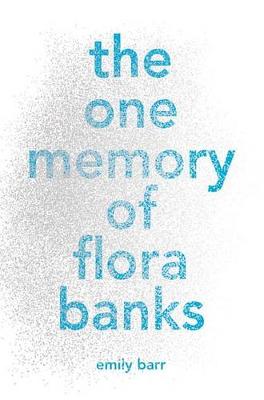
Shortlisted for the YA Book Prize 2018
HOW DO YOU KNOW WHO TO TRUST WHEN YOU CAN'T EVEN TRUST YOURSELF?
I look at my hands. One of them says FLORA BE BRAVE.
Flora has anterograde amnesia. She can't remember anything day-to-day: the joke her friend made, the instructions her parents gave her, how old she is.
Then she kisses someone she shouldn't, and the next day she remembers it. It's the first time she's remembered anything since she was ten.
But the boy is gone. She thinks he's moved to the Arctic.
Will following him be the key to unlocking her memory? Who can she trust?
THE ONE MEMORY OF FLORA BANKS is the unforgettable YA novel to take home this summer.
"Barr's YA debut is a riveting page-turner that will keep you hooked till the end." - Entertainment Weekly"An icily atmospheric story with a captivating hook...A pacy page-turner that packs a significant emotional punch" - Guardian
"Gripping. . . We promise you won't see the end coming." - HelloGiggles
"a winning mix of a John Green/ Rainbow Rowell-style sharpness and sensitivity but underlined with a darker edge" - View Magazine
"Do yourself a huge favor and grab this atmospheric, unique mystery for your Memorial Day weekend getaway." - Bustle.com
"An absorbing, original and definitely memorable book." - S Magazine
"An extraordinarily moving and original novel, a story of secrecy and lie, love and loss that manages to be both heart-breaking and life-affirming ...This is Barr's first novel for teenagers and it is as brave as Flora herself". - Daily Mail
- ISBN10 1524774790
- ISBN13 9781524774790
- Publish Date 28 August 2017 (first published 12 December 2016)
- Publish Status Withdrawn
- Imprint Listening Library
- Format Audiobook (CD)
- Duration 8 hours and 38 minutes
- Language English
Reviews


Nessa Luna

Sam@WLABB
I was wary when I began this book, because I had seen quite a few "meh" reviews, and I have to say, at first, it was difficult to adjust to the style. This story is told from Flora's point of view, so we spend a lot of time inside her head. It's sort of jarring at times. She is an amnesiac with limited short-term memory, so there is a lot of repeating and revisiting things over and over again. This took some getting used to, but I must say, Barr did a wonderful job helping me sort of understand Flora's daily struggles.
At the same time, we saw this spirited side of Flora. A part of her that wanted to break free and explore. To make new memories, even if she may not remember them. She had adaptations in place to cope with her daily life, and I was really impressed with what she was able to accomplish. The phrase, "Be Brave, Flora", kept popping up, and I love this idea that even if we have obstacles in our way, we can be brave, and try new things. We can change and grow and continue to hope.
During most of the book, I felt my heart breaking. Here is this young woman, who is stuck at the age of 10. It made me think really hard about not being able to have new memories or being able to learn new things. The whole idea of that weighed heavily on me, but not on Flora. It was almost sold as liberating, as she was forced to live in the now and enjoy the present to the fullest extent. Another great take away courtesy of Flora Banks.
I must say, I loved the relationship between Flora and her brother, Jacob. It was very special. Although they were separated by 7 years and lived in different countries, he was always trying to be her champion. He loved her fiercely and saw only the best parts of her. We get to know Jacob through letters, emails, texts, and flashbacks, and I really wish the story had been able to bring those two back together, but I am grateful for what we got. It was a lovely bond they shared, and heck, I have tears in my eyes just thinking about it.
Overall: An interesting coming-of-age story, which balances the sad with hope.

pamela
Flora Banks is a teenager who has anterograde amnesia. A tumour when she was ten made it impossible for her to create new memories and so she lives her life in a state of confusion, with the memories of a ten-year-old, but the body and emotions of a teenager. One night, she kisses a boy on the beach and for the first time she has a memory that stays. What follows is the story of her trying to hang on to that memory, a story that will twist and turn and take her on an adventure to the other side of the world.
Flora is an incredibly memorable character. As the narrator, her quirks and mannerisms show themselves in interesting ways. A lot of the narrative is repetitive for that reason, because we are experiencing the way that Flora’s mind works, but the repetition had just enough difference as to keep it interesting. I found the way it was written fascinating rather than boring. Flora writes things down (think Memento) to remind herself of them, and builds a physical trail of memories for her future self to follow.
The other characters in the book have no real characterisations of their own. Instead we experience them through Flora’s eyes, and for obvious reasons she proves herself a rather unreliable narrator. What is true of the people that she knows in one chapter can be completely turned on its head the next. We see Flora’s parents how she sees them at certain times in the narrative, and the same goes for the boy she kissed and her best friend. It made for very interesting reading and stylistically I simply can’t fault this book.
The big problem with this book, and indeed with so many books dealing with any kind of chronic illness, is that it doesn’t always deal with said illness in the best possible way. Despite the characters of the novel responding to her positively and appreciating her for everything that she is, Flora herself latches on to the one thing she feels she needs to be; normal. It is this idea of normalcy that makes this novel so problematic, especially when we factor in the layers of self-deception practiced by her family, and by herself on more than on occasion. It is this self-deception that needed to be tackled to give this book the depth that it needed. For me, one of the most tragic and underdeveloped characters of the whole novel is Flora’s mother. At times she is painted as a villain, but reading between the lines you can see a deeply troubled woman with her own mental illness to deal with who is given virtually no page time. The One Memory of Flora Banks had the potential to delve so deeply in to the subject of chronic illness, but instead it seemed to romanticise it and ultimately raised more problems than it solved.
I thoroughly enjoyed the experience of reading The One Memory of Flora Banks, even if I didn’t really love where it went. It was beautifully written, with a unique style and a memorable protagonist. With a bit more depth I think it could have been a great, and indeed important work of YA fiction, but it is not quite there yet.
Review also at I Blame Wizards
